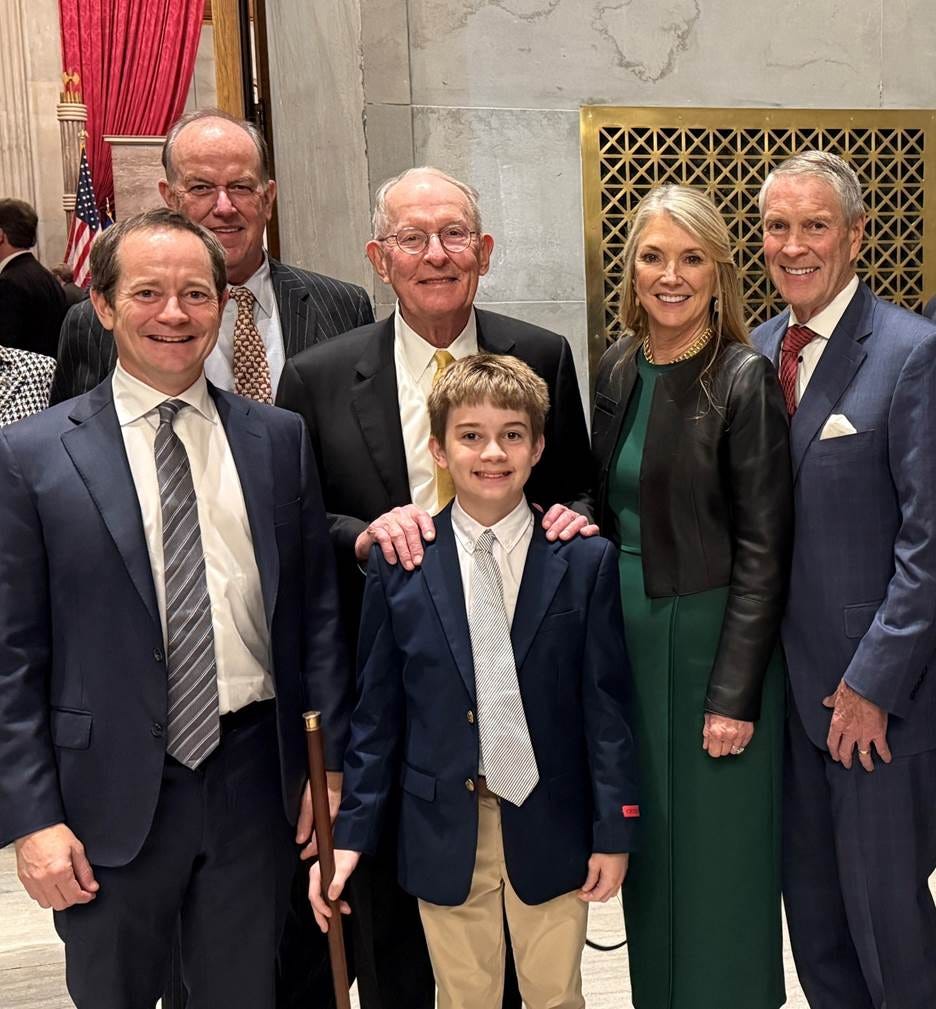This past week, the Global Board of The Nature Conservancy (TNC) gathered in my hometown of Nashville. During their visit, board members had the opportunity to experience some of the incredible natural treasures we enjoy here in Tennessee—the most biodiverse inland state in the country—and to hear about Tennessee’s longstanding tradition of national and state leadership in preserving nature.
All the conversation led me to reflect on how important conservation policy is to the health and wellbeing of future generations. The health of the soil, the air we breathe, and the food we eat are all essential to good human health. I’m reminded that amidst the partisanship and turbulence in DC, nature is common ground. It brings people together.
A Legacy of Leadership: Tennessee’s Conservation Champions
My good friend Lamar Alexander—who has served as Tennessee’s governor, U.S. Secretary of Education, and U.S. Senator—joined us for an evening and was recognized from the stage as one of Tennessee’s great conservationists.

Lamar’s commitment to protecting the environment spans decades, beginning with his role as Chair of President Ronald Reagan’s Commission on Americans Outdoors in 1985. He built on that foundation during his time in the U.S. Senate, where he co-authored the landmark Great American Outdoors Act, a remarkable bipartisan initiative signed into law in 2020. This legislation is the largest federal investment in national parks since the Eisenhower administration. Importantly it made permanent the Land and Water Conservation Fund, a critical tool for preserving public lands across the country which state and local communities depend on. And it set up and funds for five years (up for reauthorization next year) the National Parks and Public Land Legacy Restoration Fund, which is investing in land management, cutting in half the $12 billion maintenance backlog across our treasured national parks, forests, and public lands. Over the past four years, the Legacy Restoration Fund projects have supported an average of 17,000 jobs and generated an average of $1.8 billion for local economies annually – an initiative that benefits people’s livelihoods and the places they live.
But Senator Alexander was not the first Tennessee leader to leave a lasting mark on conservation.
Tennessee has a rich legacy of statesmen who have championed environmental stewardship. My predecessor as Senate Majority Leader, Senator Howard Baker, a Republican from Huntsville, Tennessee, was a key architect of the Clean Air Act of 1970, one of the nation’s first and most significant environmental laws. He considered it one of his greatest achievements, “I was never more proud than to be identified as one of the authors of the Clean Air Act of 1970.”
That foundational legislation established national air quality standards, regulated industrial and vehicular emissions, and required states to develop and enforce plans to meet those standards. It also provided teeth to enforce the new law through the Environmental Protection Agency (EPA) and certain funding mechanisms.
The results have been life-changing for generations. The Clean Air Act dramatically improved air quality in the U.S., which directly led to longer life expectancy, fewer illnesses, and better quality of life, especially for vulnerable populations. An analysis by the EPA found the Act and its later amendments prevented over 230,000 early deaths between 1990 - 2020. It was also found to provide a net improvement in economic growth due to reduced medical costs and improved productivity due to cleaner air. It's considered one of the most successful public health policies in our nation’s history.
Howard Baker is widely recognized as a model of moderate Republican environmental leadership.
The Power of Policy to Save Lives and Landscapes
During my own time in the Senate representing Tennessee, inspired by Baker’s legacy and my personal experiences as a physician overseas, I led on the Water for the Poor Act, which directed U.S. resources toward improving access to safe drinking water and sanitation in developing nations. In the late 1990s, waterborne illnesses and diarrheal diseases were the leading cause of death for children under five worldwide. As a physician on medical mission trips to Bangladesh, Haiti, and the Democratic Republic of Congo, I had witnessed the devastating impacts of water-borne pathogens such as E. Coli, cholera and typhoid. Investing in clean water meant saving lives—an effort that was both good for the planet and good for human health.

Conserving the Appalachians: Today’s Global Work Starts at Home
This early work paved the way for my engagement today as the Global Board Chair for The Nature Conservancy, the largest conservation organization in the world, where we’re spearheading conservation efforts in places like the Appalachians, one of the country’s most climate-resilient, biologically diverse, and carbon-rich landscapes. The Appalachian Mountains span 13 states, including Tennessee, and host over one-third of U.S. plants, over half of North America's fish, and 64 high-priority migratory bird species, in addition to at least 22 million people who call this region home. In the Tennessee Appalachians, TNC focuses on three key areas: freshwater conservation, land protection, and forest management. This includes protecting the extensive karst landscapes on the Cumberland Plateau—a network of caves, springs, and underground rivers that are essential for clean drinking water and rare aquatic life. Tennessee is home to 11,000 caves, more than any other state.
Governing for Growth and Green: Governor Bill Lee’s Vision
Tennessee’s conservation legacy also includes leaders like Phil Bredesen, who, before becoming governor, founded The Land Trust for Tennessee, a statewide organization dedicated to conserving the unique character of Tennessee's natural and historic landscapes. Since its founding, the Land Trust has helped protect an impressive 137,000+ acres of land through voluntary conservation easements and partnerships with private landowners. As governor, Bredesen built on this work in 2005 when he signed legislation creating the Tennessee Heritage Conservation Trust Fund, enhancing the state's ability to purchase and protect ecologically and historically significant lands. And in 2007, he led the Connecting the Cumberlands initiative in partnership with The Nature Conservancy and two conservation-minded timber companies, which secured 127,000 acres in the northern Cumberland Plateau. This initiative marked the largest land conservation project in Tennessee since the establishment of the Great Smoky Mountains National Park, ensuring the preservation of a vast, unbroken expanse of forest.
Today, this tradition continues under Governor Bill Lee, who has made conserving Tennessee’s natural resources a key part of his administration. A total of 14 new Tennessee State Parks have been established under Gov. Lee’s leadership, setting the Tennessee record for the most state parks created by one administration. He’s proven himself a fiscally responsible leader who balances our budget and annually contributes to our “Rainy Day” fund, while still making conservation funding a priority. The Lee Administration has made an historic investment of over $100 million to the Heritage Conservation Trust Fund for land protection and created the Farmland and Forestland Preservation Fund grant program for farmers and foresters who wish to voluntarily place their land in a permanent conservation easement. Gov. Lee also signed an executive order facilitating a comprehensive plan for statewide water conservation and the conservation of the Duck River (North America’s most biologically diverse freshwater river), while simultaneously establishing The Duck River Watershed Planning Partnership. In addition, Gov. Lee established the Tennessee Outdoor Partnership on which The Nature Conservancy is represented and is a public/private partnership that seeks to build on the momentum of outdoor recreation and investments into Tennessee’s great outdoors.
As Governor Lee said in his most recent State of the State address:
“How do we balance record growth with a plan to protect our natural resources? You start by rejecting conventional wisdom that says you cannot do both. To grow Tennessee, we have to conserve Tennessee.”

Policy Shapes the Future: Why Conservation Demands Action
The overwhelming majority of people believe and understand that to have a thriving planet, to have healthy soil and healthy air, and to have clean water, we must have effective policy. Policy makes conservation and climate action possible by driving systemic change at scale. Nature is common ground and common sense. Nature policy is nonpartisan.
We know people care about clean air, clean water, and access to nature. They care about hunting and fishing. They care about what happens in their backyards. And the government has a responsibility to provide these benefits to people. Supporting sound nature policy is about what future we want to leave behind for our children and grandchildren. Unlike anything else, policy shapes and defines the future.
I am deeply grateful to the leaders of our state—past and present—who have prioritized the preservation of our rich biodiversity, majestic beauty, and natural resources. Their efforts leave a legacy that benefits not only Tennesseans, but people across the country and around the world. These investments in nature make a profound difference in the health and wellbeing of generations to come. Preserving nature is protecting the life of all living things.





I grew up thinking conservation was mostly about preserving scenic views. It took me a while to realize it’s really about health, clean water, economic stability, and even national resilience. Tennessee’s story proves that when policy meets long-term vision, everyone wins. Wish more states had this kind of continuity across political lines.
As a recent visitor to the Henry Horton State Park, I'm very glad Governor Lee has moved to conserve the Duck River. It's a resource we need to care for.